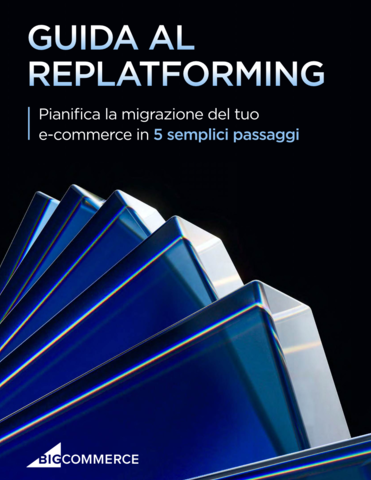Build market share by embracing your digital transformation
Sponsored by BigCommerceDiscover your company’s digital maturity to find opportunities for growth.

Whether you’re a multinational distributor or a family-owned manufacturer, the chances are your business doesn’t look the same as it did ten years ago.
Customers aren’t shopping how they used to. Supply chains are connected like never before. And new technology has changed the way you buy and sell your products. This rapid shift in all areas of business have left many playing a game of catch-up.
Many business-to-business (B2B) sellers lag behind their direct-to-consumer (DTC) counterparts when it comes to adoption of these new technologies. As DTC selling moves online, some in the B2B space are still using fax machines and filing cabinets to process and handle orders. Many of those that have moved online still rely on outdated systems that leave buyers frustrated by sub-par customer experiences.
“The way B2B buyers shop is changing, and B2B merchants need to adapt,” says Lance Owide, B2B General Manager at BigCommerce. “Buyers are turning to online channels to research, compare and purchase products. B2B merchants need to have a strong online presence and offer seamless omnichannel shopping experiences, across the entire buying lifecycle, from purchase to service, to keep buyers loyal or risk losing market share.”
But what makes one company more “digitally mature” than another? Digital maturity is more than a simple assessment of how many tools a company uses or how fast a sale can be processed. It is a measure of digital integration through all aspects of a company’s operations.
Let’s take a look at the concept of digital maturity, how it’s measured and how one BigCommerce customer is diving headfirst into their B2B digital transformation.
What is digital maturity?
Digital maturity is a measure of how integrated digital processes are in your business, how technology aligns with overall business strategy and how the people within your organisation see technology impacting day-to-day operations.
A recent report by Accenture found that 72 per cent of businesses that actively assess their digital maturity levels experience accelerated growth compared with those that do not engage in such evaluations.
How is digital maturity measured?
We look at a business’s digital maturity through two separate lenses. The first is a company’s actual digital maturity score, which can be broken down into three specific areas: digital processes, technology alignment, and people. Then we subdivide those areas into keys to success, which further break down the core competencies into key aspects of your business and its operations.
Digital processes
This score measures your business’s adoption of digital technologies for internal operations. This includes reporting (how well your business gathers data, both internally and externally, and how it acts upon that data); process optimisation (whether or not your business strives to optimise operations and processes); and innovation (willingness to try new technologies or processes to improve overall operations).
Technology alignment
Technology alignment measures the rate at which data can be shared between departments in your organisation. This is a cornerstone of a solid digital strategy, as communication and data-sharing are key when it comes to optimal process management. This includes technology (what kinds of technologies your business uses and how efficiently they interact with one another); data (from where and how quickly data can be gathered, aggregated, analysed and acted upon); and budget (what value your business places on optimising these processes).
People
Your People score measures the culture of digital innovation within your organisation. This encompasses leadership (how company leadership views technological advancement); communication (both internal and external communications); and internal operations (whether or not your company fosters and rewards innovation).
Each competency and key to success plays a pivotal role in determining how digitally mature and technologically advanced your organisation is. These scales also provide insights into how businesses can improve operations and where opportunities for advancement may lie.
A leader in the industry: MKM Building Supplies
BigCommerce customer MKM Building Supplies is a visionary company that wanted to truly transform its operations and become an industry leader within its vertical. Let’s dissect their digital transformation using our maturity scale to see how MKM reached the head of the pack.
Digital processes
MKM had a clearly defined, data-driven B2B digital strategy focused on customer segmentation, personalised experiences and frictionless online ordering.
Technology alignment
MKM used a composable commerce architecture, which allowed it to integrate best-in-breed B2B e-commerce functionalities (product information management, customer portals, marketing automation) to create a highly customised and scalable platform.
People
MKM fostered a culture of continuous learning and innovation. It invested heavily in training its employees on the latest B2B digital technologies and empowered them to leverage data insights to improve customer service and product recommendations.
Market perception
MKM is a leader in the industry, winning the MACH Alliance Impact Award for a B2B Project for its BigCommerce implementation. Here’s how MKM’s approach may be perceived by the market:
- MKM’s data-driven, composable commerce platform allows it to offer a hyper-personalised buying experience for different customer segments, greatly exceeding the online experiences offered by their competition.
- MKM builds stronger customer relationships and loyalty by leveraging data analytics to anticipate customer needs and personalise product recommendations.
- MKM’s commitment to continuous learning and bringing offline processes online allows it to quickly adapt to changing B2B customer needs and industry trends.
Maturing as a B2B seller
MKM Building Supplies transitioned from a traditional model to a composable e-commerce platform. Its experience demonstrates the significant impact this approach can have on sales, customer satisfaction and overall business growth. MKM is a perfect case study for showcasing a company that not only implements the technology but also fosters a data-driven culture and continuous improvement mindset.
Find your B2B maturity score
It’s the gold rush for B2B businesses selling online. Those that take the leap and truly transform their operations to meet the digital future head-on will see massive opportunity in the years ahead. Those that don’t won’t be so lucky.
By analysing your organisation using our digital maturity approach, your business may position itself as a true leader within your space and attract investment, talent and, most importantly, customers.
Want to determine your business’s maturity score and see how you can grow? Take the assessment here.
Reed Hartman, Content Marketing Manager, BigCommerce

Business Reporter Team
Related Articles
Most Viewed
Winston House, 3rd Floor, Units 306-309, 2-4 Dollis Park, London, N3 1HF
23-29 Hendon Lane, London, N3 1RT
020 8349 4363
© 2025, Lyonsdown Limited. Business Reporter® is a registered trademark of Lyonsdown Ltd. VAT registration number: 830519543





